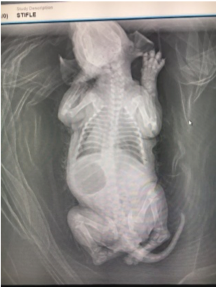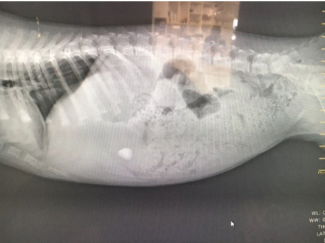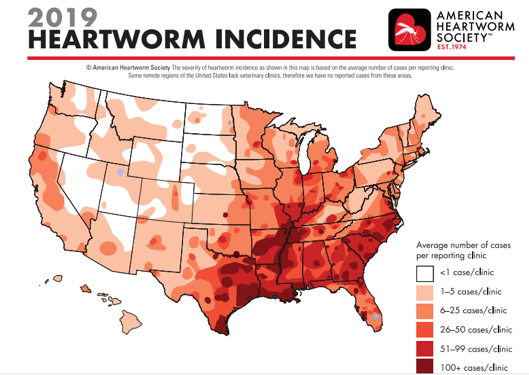Canine infectious respiratory disease
In August 2023 an atypical canine infectious respiratory illness was reported in Oregon. These infections primarily fall within three general clinical syndromes:
- Chronic mild to moderate tracheobronchitis with A prolonged duration (6-8 weeks) that does not respond well to antibiotics.
- Chronic pneumonia that is not responsive to
antibiotics. - Acute pneumonia rapidly becomes severe and often leads to a poor outcome in as little as 24-36 hours.
Many specialists are actively working to find the cause of these infections. The Oregon department of agriculture and the chief medical officer for the Oregon Humane Society do not want people to panic because the number of reported cases is very small. They do have a list of precautions that pet owners may choose to take.
Five things you can do to mitigate risk of infection –
- Vaccinate your dog as recommended by your veterinarian. This may include vaccinations for canine influenza, Bordetella, parainfluenza and canine adenovirus.
- Avoid communal water bowls and toys.
- Avoid playdates with unknown dogs. Socialization is important for your dog, so you might want to consider creating a playgroup of dogs that you know are fully vaccinated.
- Avoid exposure to settings with unknown dogs, such as dog parks.
- If your dog is sick, keep them at home and seek veterinary care.
Once we know more about this disease, or if we begin to see possible cases in the state of Utah, we will let you know via email or on our website.
Dental News
Contrary to popular belief, “doggy breath” is not normal. If your dog or cat has bad breath, he could have dental disease which is a painful condition caused by bacteria infecting the tissues of the mouth. What’s even worse than bad breath is that dental disease can lead to serious health issues as infection can spread throughout their body.
Since maintaining oral hygiene is crucial to keeping cats and dogs healthy and happy, the American Animal Hospital Association (AAHA), created dental care guidelines that can help you and your veterinarian provide the best dental care possible for your pet. The following are important points of these guidelines.

- Dental disease begins early in life.
Cats and small dogs can begin to develop dental disease as early as nine months old. By the time they’ve reached their third birthday, most dogs and cats begin showing signs of dental disease, such as bad breath, yellow tartar buildup on the teeth, and red, swollen gums. Left untreated, throbbing pain and inflammation can cause pets to drop food, drool excessively, paw at their mouth, or become reactive to petting. But, because most dogs and cats are experts at hiding pain, many suffer in silence. - Early detection is key. As a part of your pet’s annual veterinary checkup, AAHA recommends dental evaluations at least once a year when your cat or small breed dog reaches one year of age, or when your large breed dog turns two.
- “Xray vision” is essential for diagnosing dental disease. There is no way to evaluate the lower part of the tooth and the tooth roots without xray images. Dental radiographs should be performed on every oral health procedure because more than 50% of dental disease is found under the gum line.
- Anesthesia makes dental evaluation and treatment safer and less stressful for your pet. Oral health procedures performed with anesthetized patients allow veterinarians to make a more accurate diagnosis, allow for a more thorough treatment, and decrease the chance of complications, like inhaling water or bacteria produced during the procedure.
- Anesthesia is much safer than you think. AAHA’s guidelines include steps to increase the safety of anesthesia, even in older pets. Part of these guidelines include carefully screening the patient with bloodwork and other tests to ensure that they are free from underlying disease. Also, making sure that there is at least one trained professional dedicated to continuously monitoring, recording vital signs, and communicating the findings to the veterinarian throughout the entire procedure.
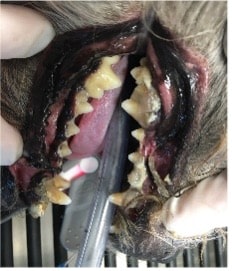 Removing plaque from teeth beneath the gums is vital. In fact, it is even more important than scaling the portion of the teeth we can see. Bacteria thrive under the gumline, causing infections deep in the tooth root and jaw that can spread throughout the body and affect other organs, such as the heart or kidneys.
Removing plaque from teeth beneath the gums is vital. In fact, it is even more important than scaling the portion of the teeth we can see. Bacteria thrive under the gumline, causing infections deep in the tooth root and jaw that can spread throughout the body and affect other organs, such as the heart or kidneys.- There are many similarities between human and veterinary dentistry. Veterinarians and credentialed technicians use sharp, sterilized instruments, just like those you see in your dentist’s office. Board-certified veterinary dentists go through extensive residency training to perform advanced procedures like root canals, tooth extractions, and crowns. Preventative procedures such as tooth brushing should be performed daily on your pet just like your teeth.
- Your veterinarian may create a personalized pain protocol to keep your pet comfortable. Although your dog or cat will be anesthetized during a tooth extraction, numbing medications will decrease the amount of general anesthetic needed and can last up to eight hours after the procedure, allowing your pet to rest in comfort. Your veterinarian can tailor your pet’s prescription pain medication to match the procedure, so he’ll recover peacefully at home.
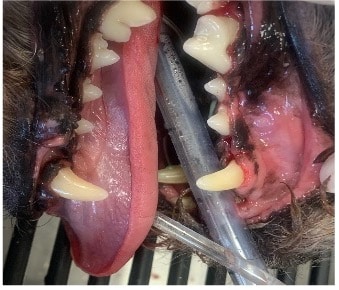 Don’t forget to brush! Brushing your cat or dog’s teeth every day will promote good oral health and prevent potentially expensive surgeries later.
Don’t forget to brush! Brushing your cat or dog’s teeth every day will promote good oral health and prevent potentially expensive surgeries later.
There are special pet toothpastes that are flavored so that your pet will more readily accept them. Please never use human toothpaste as it can contain ingredients such as xylitol that can be toxic to animals.- Consider using other products if brushing isn’t an option. Oral rinses, gels, sprays, water additives, and chews can help with your pet’s dental hygiene. Be sure to look for the Veterinary Oral Health Council (VOHC) seal of approval on all pet dental products. The VOHC website (www.vohc.org), shows how to brush your pet’s teeth and gives other great information.
If you have any questions about dental health or any other questions that our professional team can answer for you, please call (801)254-6621. To take advantage of the discounted pricing, please schedule your pet’s oral health procedure at your earliest convenience.
If you have any questions about dental health or any other questions that our professional team can answer for you, please call (801)254-6621. To take advantage of the discounted pricing, please schedule your pet’s oral health procedure at your earliest convenience.











